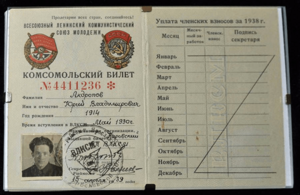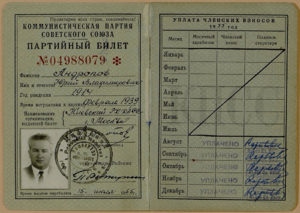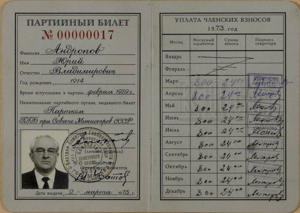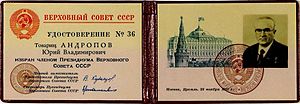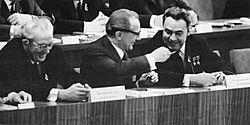Yuri Andropov facts for kids
Quick facts for kids
Yuri Andropov
|
|
|---|---|
|
Юрий Андропов
|
|
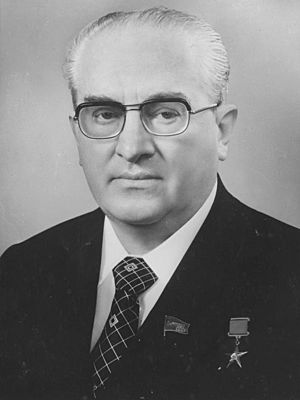
Andropov in 1983
|
|
| General Secretary of the Communist Party of the Soviet Union | |
| In office 12 November 1982 – 9 February 1984 |
|
| Preceded by | Leonid Brezhnev |
| Succeeded by | Konstantin Chernenko |
| Chairman of the Presidium of the Supreme Soviet |
|
| In office 16 June 1983 – 9 February 1984 |
|
| Preceded by | Vasili Kuznetsov (acting) |
| Succeeded by | Vasili Kuznetsov (acting) |
| Second Secretary of the Communist Party of the Soviet Union | |
| In office 24 May 1982 – 10 November 1982 |
|
| Preceded by | Konstantin Chernenko (acting) |
| Succeeded by | Konstantin Chernenko |
| 4th Chairman of the Committee for State Security (KGB) | |
| In office 18 May 1967 – 26 May 1982 |
|
| Premier | |
| Preceded by | Vladimir Semichastny |
| Succeeded by | Vitaly Fedorchuk |
| Personal details | |
| Born | 15 June 1914 Stanitsa Nagutskaya, Stavropol Governorate, Russian Empire |
| Died | 9 February 1984 (aged 69) Moscow, Soviet Union |
| Resting place | Kremlin Wall Necropolis |
| Political party | CPSU (1939–1984) |
| Spouses |
|
| Children |
4
Evgenia Andropova Igor Andropov Irina Andropova Vladimir Andropov |
| Residence | Kutuzovsky Prospekt |
| Signature | |
| Military service | |
| Allegiance | Soviet Union |
| Branch/service | Soviet Armed Forces Soviet Partisans |
| Years of service | 1939–1984 |
| Rank | General of the Army |
| Battles/wars | World War II Hungarian Revolt Soviet–Afghan War |
|
Central institution membership
1973–1984: Full, 24th, 25th, 26th Politburo
1967–1973: Candidate, 23rd, 24th Politburo 1962–1967 & 1982–1984: Member, 22nd, 23rd, 26th Secretariat 1961–1984: Full member, 22nd, 23rd, 24th, 25th, 26th Central Committee Other political offices held
1957–1967: Head, Department for Relations with the Communist and Workers' Parties of the Socialist Countries
1954–1957: Ambassador, Hungary |
|
Yuri Vladimirovich Andropov (June 15, 1914 – February 9, 1984) was a powerful leader of the Soviet Union. He served as the fourth General Secretary of the Communist Party of the Soviet Union. Andropov took over after Leonid Brezhnev's long rule. He led the country from November 1982 until his death in February 1984.
Before becoming the top leader, Andropov was the Soviet ambassador to Hungary from 1954 to 1957. During this time, he was involved in stopping the 1956 Hungarian Uprising. Later, he became the head of the KGB (the Soviet Union's main security agency) in 1967. In this role, he worked to stop people who disagreed with the government. He also helped shape policies alongside other top officials during Brezhnev's later years.
When Brezhnev died in November 1982, Andropov became the leader of the Soviet Union. He tried to fix problems like corruption and inefficiency. He also wanted to make workers more disciplined. The Cold War became more intense during his time. Andropov helped bring new, younger leaders into power, like Mikhail Gorbachev. Andropov's health got worse in 1983 due to kidney failure. He died in February 1984, after leading the country for about 15 months.
Contents
Early Life and Education
Yuri Andropov was born on June 15, 1914, in Nagutskaya, which is now in Russia. His father, Vladimir Konstantinovich Andropov, worked on the railway and died in 1919. His mother, Yevgenia Karlovna Fleckenstein, was a school teacher. She passed away in 1931.
Andropov studied at the Rybinsk Water Transport Technical College. He finished his studies in 1936. As a teenager, he worked different jobs. He was a loader, a telegraph clerk, and a sailor.
Early Career in Politics
At 16, Andropov joined the Komsomol, which was a youth organization linked to the Communist Party. He quickly moved up in the organization. He became a leader in the Komsomol in different regions. From 1940 to 1944, he was the First Secretary of the Komsomol in the Soviet Karelo-Finnish Republic.
During World War II, Andropov was involved in Communist Party work. He continued his studies at the University of Petrozavodsk. In 1947, he became the Second Secretary of the Communist Party of the Karelo-Finnish SSR. In 1951, he moved to work for the main CPSU Central Committee in Moscow.
Role in Hungarian Uprising
In 1954, Andropov became the Soviet Ambassador to Hungary. He was in this role during the Hungarian Revolution of 1956. This was a major uprising against the Soviet-backed government. Andropov played a key part in convincing Soviet leaders that they needed to send in the military. The uprising was stopped by force. Some Hungarian leaders were arrested and executed.
After these events, Andropov was very worried about other Communist governments falling. He believed that only military force could keep them in power. This fear influenced his decisions later on.
Leading the KGB
In 1957, Andropov returned to Moscow. He became the head of a department that dealt with other Communist countries. In 1967, he was chosen to lead the KGB, the Soviet Union's main security agency. He also became a candidate member of the Politburo, which was the top decision-making group. In 1973, he became a full member of the Politburo, gaining more power.
Stopping Dissent
As head of the KGB, Andropov worked to stop people who spoke out against the Soviet government. He believed that fighting for human rights was a plot to weaken the Soviet state. He used various methods to control opposition. This included arresting people and putting pressure on activists to leave the country. Sometimes, people who disagreed with the government were sent to psychiatric hospitals.
Andropov created a special department within the KGB to deal with political opposition. This department kept files on all Soviet dissidents, including famous figures like Andrei Sakharov.
Afghanistan and Poland
In 1979, Andropov and other leaders first did not want to send troops into Afghanistan. They worried about how the world would react. However, after a change in leadership in Afghanistan, Andropov became convinced that the US was trying to gain influence there. This led to the Soviet invasion of Afghanistan in December 1979. This war lasted for many years and had a big impact on the Soviet Union.
In 1981, there was a strong workers' movement in Poland called Solidarity. Andropov and other Soviet leaders decided not to invade Poland. They believed it would cause more problems for the Soviet Union. Instead, they let the Polish leaders handle the situation themselves.
Promoting New Leaders
While leading the KGB, Andropov also supported younger, more reform-minded officials. One of the most important people he promoted was Mikhail Gorbachev. Andropov stayed as KGB head until May 1982. Then, he was promoted to a key role in the Communist Party's Secretariat.
Leader of the Soviet Union
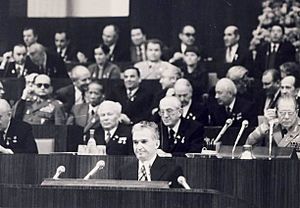
After Brezhnev's death, Yuri Andropov was chosen as the new General Secretary of the Communist Party. This made him the leader of the Soviet Union. Western countries were unsure about him because of his past role in the KGB.
Andropov shared some duties with his deputy, Konstantin Chernenko. Andropov focused on defense, foreign policy, and top leadership roles. Chernenko handled areas like the KGB, party organization, and propaganda.
Changes at Home
Andropov tried to improve the Soviet economy. He wanted to make workers more efficient. He took action against people who missed work or were late. He also allowed some industries more freedom from strict government rules. These changes led to a small increase in industrial output. However, Andropov did not want to change the basic system of the Soviet economy.
He also started a campaign against corruption. He removed many officials who had been close to Brezhnev. He even started criminal cases against some high-ranking party members. This helped him gain more power and was seen by some as a way to clean up the government.
Foreign Relations
Andropov faced many challenges in foreign policy. The war in Afghanistan continued. Relations with the United States got worse. US President Ronald Reagan called the Soviet Union an "evil empire". Reagan also started a new defense program called the Strategic Defense Initiative. Andropov strongly disagreed with this, saying it was "insane."
In 1983, a civilian airplane, Korean Air Flight KAL-007, flew into Soviet airspace by mistake. Soviet fighters shot it down, killing all 269 people on board. This caused a huge international outcry. The Soviet Union kept secret that they had found the plane's black box, which showed the pilot made a mistake. This event made the Soviet Union look bad around the world.
Death and Funeral
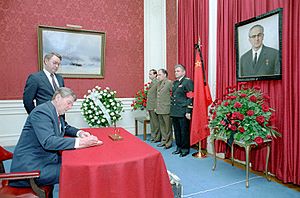
In February 1983, Andropov's health became very bad. He suffered from kidney failure. He spent the rest of his life in a hospital in Moscow.
Andropov died on February 9, 1984, at the age of 69. Many top Soviet leaders did not know about his death right away. The Soviet government announced a four-day period of mourning. Many foreign leaders attended his state funeral in Red Square. He was buried in the Kremlin Wall Necropolis.
After Andropov, Konstantin Chernenko became the leader. But Chernenko was also very ill and died just 13 months later. Then, Mikhail Gorbachev took over. Gorbachev brought in major reforms that eventually led to the end of the Soviet Union in 1991.
Personal Life
Andropov lived in the same building as other top Soviet leaders. He was married twice. His first marriage ended in divorce in 1941. He met his second wife, Tatyana Filippovna, during World War II. She had a difficult time after the Hungarian Revolution and was rarely seen in public. They had two children, Igor and Irina.
Legacy
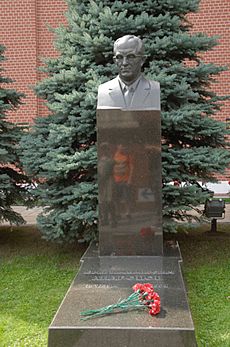
People still debate Yuri Andropov's legacy. As head of the KGB, he was very strict against those who disagreed with the government. Some people, like historian Alexander Yakovlev, saw him as very dangerous because he was so smart.
However, many also see Andropov as a reformer. He was shocked by the corruption that had grown under Brezhnev. He ordered investigations and arrests to fight this corruption. He also started to replace older officials with younger ones. Many wonder if he would have reformed the Soviet Union in a way that prevented its collapse.
Because he was only in power for a short time and was often ill, it is hard to know what his full impact would have been.
Views on Andropov
Vladimir Putin has called Andropov "a man of talent with great abilities" and praised his "honesty." However, others have different views. Russian historian Nikita Petrov said Andropov "violated human rights" and persecuted many talented people. Roy Medvedev noted that repression against dissidents increased during Andropov's time as leader.
People who knew Andropov often described him as polite, calm, intelligent, and having a sharp memory. He was known to read a lot and could communicate in several languages.
Honors and Awards
- Soviet Awards
| Hero of Socialist Labor (1974) | |
| Order of Lenin, four times | |
| Order of the October Revolution (1979) | |
| Order of the Red Banner (1944) | |
| Order of the Red Banner of Labour, thrice | |
| Medal "Partisan of the Patriotic War", 1st class (1943) | |
| Medal "For the Victory over Germany in the Great Patriotic War 1941–1945" (1945) | |
| Medal "For Valiant Labour in the Great Patriotic War 1941–1945" (1945) | |
| Medal "For Distinction in Guarding the State Border of the USSR" | |
| Jubilee Medal "Twenty Years of Victory in the Great Patriotic War 1941-1945" (1965) | |
| Jubilee Medal "Thirty Years of Victory in the Great Patriotic War 1941–1945" (1975) | |
| Jubilee Medal "In Commemoration of the 100th Anniversary of the Birth of Vladimir Ilyich Lenin" (1969) | |
| Jubilee Medal "60 Years of the Armed Forces of the USSR" (1978) | |
| Medal "In Commemoration of the 250th Anniversary of Leningrad" (1957) | |
| Medal "In Commemoration of the 1500th Anniversary of Kyiv" (1982) |
- Honorary Member of the KGB, 1973
- Foreign Awards
| Order of the Sun of Liberty (Afghanistan) | |
| Order of the Star (Afghanistan) | |
| Hero of the People's Republic of Bulgaria (Bulgaria) | |
| Order of the People's Republic of Bulgaria, 1st class (Bulgaria) | |
| Order of Georgi Dimitrov (Bulgaria) | |
| Medal "100 Years of Liberation from Ottoman Slavery" (Bulgaria) | |
| Order of the White Lion, 1st class (Czechoslovakia) | |
| Medal “For Strengthening Friendship in Arms”, Golden class (Czechoslovakia) | |
| Order of Karl Marx (East Germany) | |
| Order of the Flag of the Republic of Hungary, 1st class (Hungary) | |
| Order of Sukhbaatar (Mongolia) | |
| Order of the Red Banner (Mongolia) | |
| Jubilee Medal "50 Years Anniversary of the Mongolian Revolution" (Mongolia) | |
| Military Merit Cross of Colonel Francisco Bolognesi (Peru) |
Speeches and Works
- (in ru) Ленинизм озаряет наш путь. Moscow: Издательство политической литературы. 1964.
- (in ru) Ленинизм – наука и искусство революционного творчества. Moscow: Издательство политической литературы. 1976.
- (in ru) Коммунистическая убежденность – великая сила строителей нового мира. Moscow: Издательство политической литературы. 1977.
- "Доклад на торжественном заседании по случаю столетия со дня рождения Ф.Э. Дзержинского" (in ru). Izvestiya. 10 October 1977.
- (in ru) Шестьдесят лет СССР: доклад на совместном торжественном заседании Центрального Комитета КПСС, Верховного Совета СССР и Верховного Совета РСФСР, в Кремлевском Дворце съездов, 21 декабря 1982 года. Moscow: Издательство политической литературы. 1982. https://books.google.com/books?id=0gtLAAAAMAAJ.
- "Text of Andropov's speech at Brezhnev's funeral". The New York Times. 16 November 1982. https://www.nytimes.com/1982/11/16/world/text-of-andropov-s-speech-at-brezhnev-s-funeral.html.
- Speeches and writings. Oxford; New York: Pergamon Press. 1983. ISBN 978-0080312873. https://archive.org/details/AndropovSpeechesWritings.
- Selected speeches and articles. Moscow: Progress Publishers. 1984. ASIN B003UHCKTO.
- Speeches, articles, interviews. A Selection. South Asia Books. 1984. ISBN 978-0836411652.
- (in ru) Учение Карла Маркса и некоторые вопросы социалистического строительства в СССР. Moscow: Издательство политической литературы. 1983.
- (in ru) Ленинизм – неисчерпаемый источник революционной энергии и творчества масс. Избранные речи и статьи. Moscow: Издательство политической литературы. 1984.
- Andropov, Y.V. (1995). "The birth of samizdat". Index on Censorship 24 (3): 62–63. doi:10.1080/03064229508535948.
See also
 In Spanish: Yuri Andrópov para niños
In Spanish: Yuri Andrópov para niños
 | Claudette Colvin |
 | Myrlie Evers-Williams |
 | Alberta Odell Jones |


